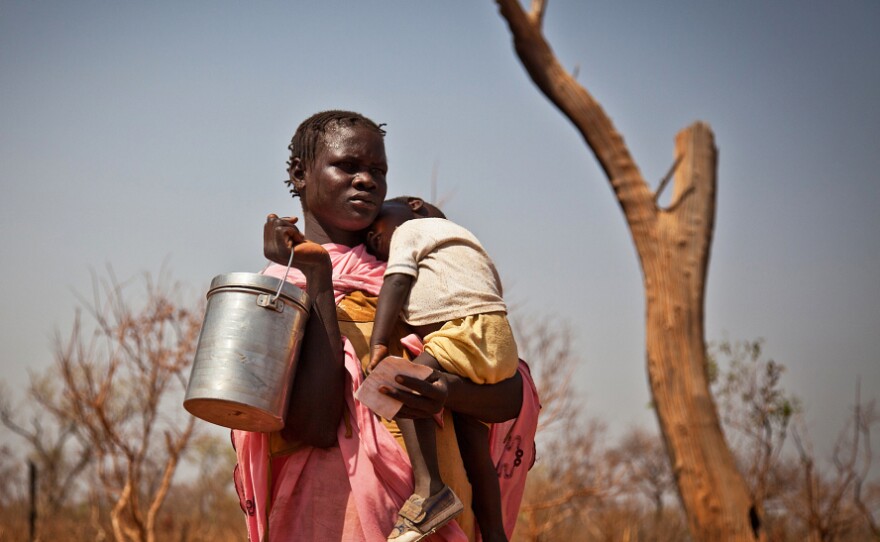The two Sudans appear to be complying with a U.N. ceasefire ultimatum, which came into force on Friday — ending weeks of bitter border fighting over oil.
But there remains a separate conflict in the Nuba Mountains region of Sudan that has forced thousands to flee bombardment and hunger for newly independent neighbor South Sudan.
Those refugees are streaming into the Yida camp in South Sudan, across the border from the Nuba Mountains in the South Kordofan area, Sudan's last remaining oil-producing state.
Communities there fought alongside the South during the long civil war. They say they are being punished for their loyalties and chased out by Sudanese government troops. Sudan claims pro-South rebels operate in the region. Human rights campaigners warn of ethnic cleansing by Sudan.
Resources Stretched Thin
In recent days, up to 500 to 550 people have been crossing the border each day, says Lise Grande, U.N. humanitarian coordinator for South Sudan. The camp has grown to house more than 27,000 refugees since it was set up in August last year.
"Now what they're telling us is that there's hunger on the other side," Grande says, adding that officials expect the numbers will keep rising.
Rania Mahmoud arrived at the camp over the weekend. Dressed in lime green cloth, she stands out against the dusty expanse of the camp. Mahmoud describes how bombs were raining down in the Nuba Mountains. So, she and six others, including her children, walked for five days to cross the border into South Sudan.
"Because of the war, plus the fact that there was no more food, we had to run away. The enemy was bombing us. You would hear 'boom' and we'd all have to hide. We were really frightened," she says.
The fleeing refugees need help — and food.
Resources are tightly stretched and the World Food Program's representative in South Sudan, Chris Nikoi, says stocking supplies at Yida has been delayed by recent clashes over oil at the north-south border.
"But we're confident that during the month of May, we will get the food here — enough to make sure that these people are fed right through the rainy season," Nikoi says, referring to rains that could last up to six months.
Safety and security also remain key concerns. Yida is easily within Sudan's shelling range and was bombed in November. Local parliamentarian Omer Ahmed Nogra displays a bomb that was dropped recently, near the school.
"We are afraid, because everyone now has a hole near his house. We are afraid," he says.
Civilians Suffering
But the refugees are reluctant to move on. That means more and more infants with malnutrition arrive every day, says Kelly Nau, health and nutrition coordinator for Samaritan's Purse, a U.S. aid organization.
"Of the children under 5, we've never seen so many malnourished in the history of the camp so far," she says.
"[The refugees] have been hiding out in caves to escape aerial bombardment and ground fighting," Nau says. "These people are telling me that they're eating leaves and they're boiling seeds, and they've come here just in search of food."
South Sudan's Deputy Minister for Humanitarian Affairs Sabrina Dario Lokolong says she hopes both her country and neighboring Sudan will respect a U.N. resolution seeking to end their conflicts.
"This issue should really come to an end. These are innocent civilians, they shouldn't be targeted," Lokolong says.
If there has to be war, let it be at the front, says the minister, not against the blameless.
Copyright 2024 NPR







